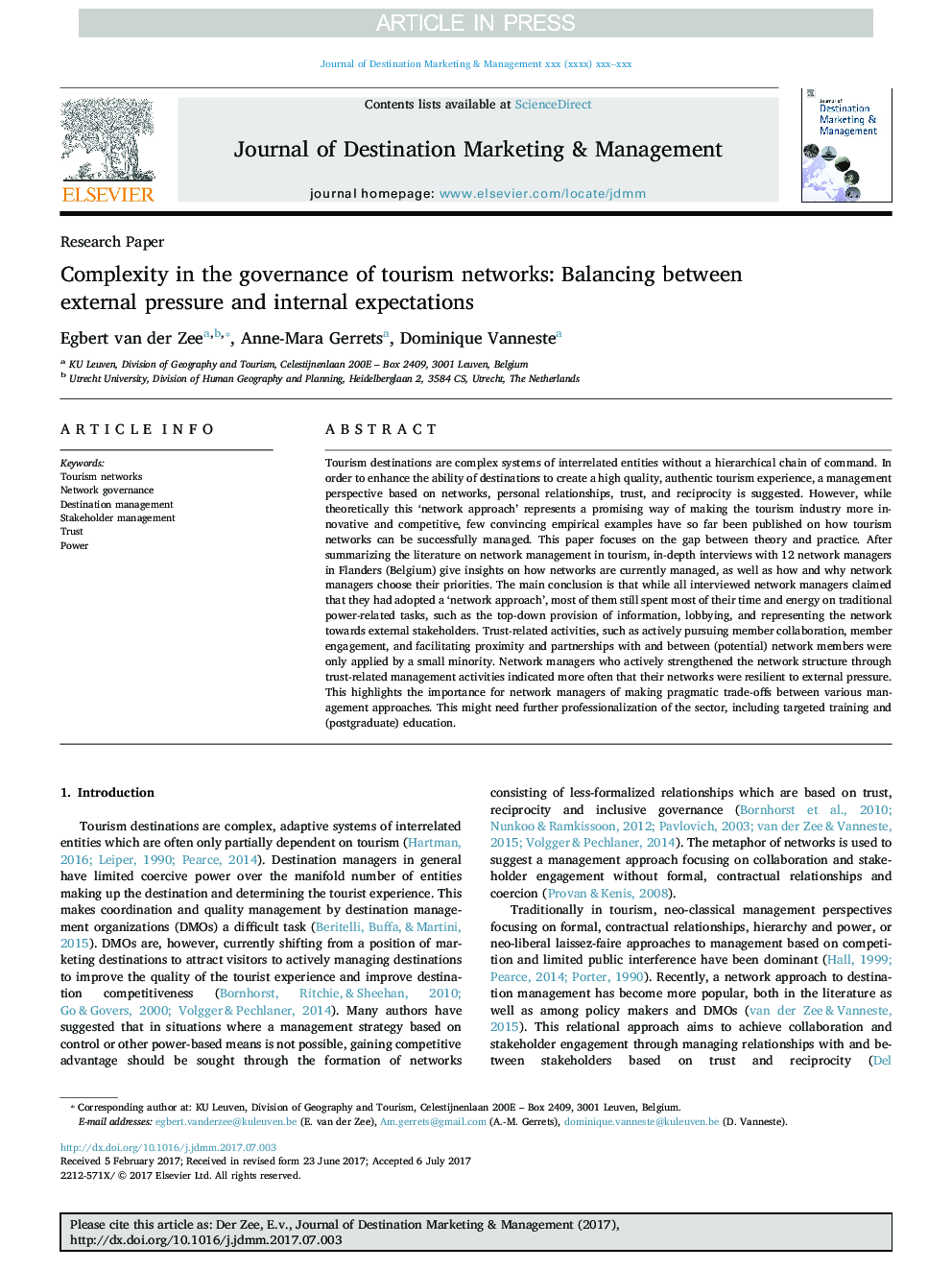| کد مقاله | کد نشریه | سال انتشار | مقاله انگلیسی | نسخه تمام متن |
|---|---|---|---|---|
| 7419738 | 1482565 | 2017 | 13 صفحه PDF | دانلود رایگان |
عنوان انگلیسی مقاله ISI
Complexity in the governance of tourism networks: Balancing between external pressure and internal expectations
ترجمه فارسی عنوان
پیچیدگی در مدیریت شبکه های گردشگری: تعادل بین فشار خارجی و انتظارات داخلی
دانلود مقاله + سفارش ترجمه
دانلود مقاله ISI انگلیسی
رایگان برای ایرانیان
کلمات کلیدی
شبکه های گردشگری، حکومتداری شبکه، مدیریت مقصد مدیریت ذینفع، اعتماد، قدرت،
ترجمه چکیده
مقصد گردشگری سیستم های پیچیده ای از نهادهای مرتبط است بدون یک سلسله مراتب سلسله مراتبی. به منظور افزایش توانایی مقصد برای ایجاد یک تجربه با کیفیت بالا، تجربه گردشگری معتبر، چشم انداز مدیریت بر اساس شبکه، روابط شخصی، اعتماد و روابط متقابل پیشنهاد شده است. با این حال، در حالی که از لحاظ نظری این رویکرد شبکه نشان دهنده یک روش امیدوار کننده برای ساختن صنعت گردشگری نوآورانه و رقابتی است، تاکنون چند نمونه تجربی قانع کننده در مورد چگونگی مدیریت موفقیت آمیز شبکه های گردشگری منتشر شده است. این مقاله بر شکاف بین تئوری و عمل تمرکز دارد. پس از خلاصه کردن ادبیات مربوط به مدیریت شبکه در گردشگری، مصاحبه عمیق با 12 مدیر شبکه در فلاندرز (بلژیک) اطلاعاتی را درباره چگونگی مدیریت شبکهها و نحوه مدیریت شبکه و اولویتهای آنها به دست میدهد. نتیجه گیری اصلی این است که در حالی که تمام مدیران شبکه مصاحبه شده ادعا کردند که "رویکرد شبکه ای" را اتخاذ کرده اند، اکثر آنها هنوز اکثر وقت و انرژی خود را صرف انجام وظایف مربوط به قدرت های سنتی مانند ارائه اطلاعات از بالا به پایین، لابی و نمایندگی شبکه در برابر ذینفعان خارجی. فعالیت های مرتبط با اعتماد، از قبیل فعال کردن مشارکت اعضاء، مشارکت اعضا و تسهیل نزدیکی و مشارکت با اعضای شبکه (پتانسیل)، تنها توسط اقلیت کوچکی اعمال می شود. مدیران شبکه که به طور فعال ساختار شبکه را از طریق فعالیت های مدیریتی مربوط به اعتماد تقویت می کنند، اغلب نشان می دهند که شبکه هایشان به فشار خارجی مقاوم هستند. این اهمیت را برای مدیران شبکه برای ایجاد همکاری عملی بین رویکردهای مختلف مدیریت برجسته می کند. این ممکن است نیاز به تخصص بیشتری در بخش، از جمله آموزش هدفمند و آموزش (تحصیلات تکمیلی) داشته باشد.
موضوعات مرتبط
علوم انسانی و اجتماعی
مدیریت، کسب و کار و حسابداری
کسب و کار، مدیریت و حسابداری (عمومی)
چکیده انگلیسی
Tourism destinations are complex systems of interrelated entities without a hierarchical chain of command. In order to enhance the ability of destinations to create a high quality, authentic tourism experience, a management perspective based on networks, personal relationships, trust, and reciprocity is suggested. However, while theoretically this 'network approach' represents a promising way of making the tourism industry more innovative and competitive, few convincing empirical examples have so far been published on how tourism networks can be successfully managed. This paper focuses on the gap between theory and practice. After summarizing the literature on network management in tourism, in-depth interviews with 12 network managers in Flanders (Belgium) give insights on how networks are currently managed, as well as how and why network managers choose their priorities. The main conclusion is that while all interviewed network managers claimed that they had adopted a 'network approach', most of them still spent most of their time and energy on traditional power-related tasks, such as the top-down provision of information, lobbying, and representing the network towards external stakeholders. Trust-related activities, such as actively pursuing member collaboration, member engagement, and facilitating proximity and partnerships with and between (potential) network members were only applied by a small minority. Network managers who actively strengthened the network structure through trust-related management activities indicated more often that their networks were resilient to external pressure. This highlights the importance for network managers of making pragmatic trade-offs between various management approaches. This might need further professionalization of the sector, including targeted training and (postgraduate) education.
ناشر
Database: Elsevier - ScienceDirect (ساینس دایرکت)
Journal: Journal of Destination Marketing & Management - Volume 6, Issue 4, December 2017, Pages 296-308
Journal: Journal of Destination Marketing & Management - Volume 6, Issue 4, December 2017, Pages 296-308
نویسندگان
Egbert van der Zee, Anne-Mara Gerrets, Dominique Vanneste,
